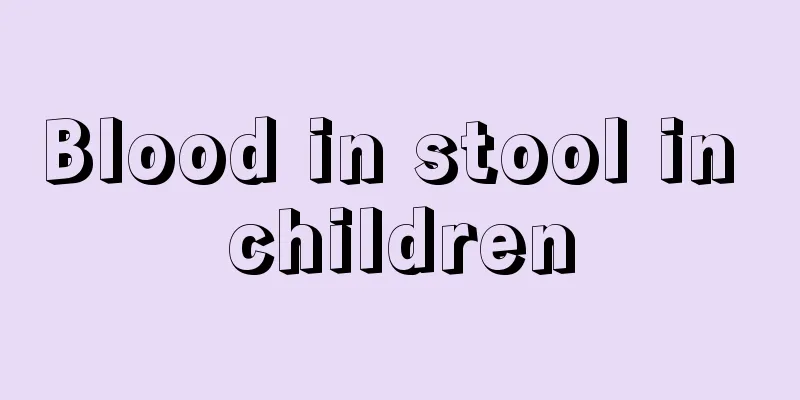Blood in stool in children

|
The health of children concerns parents. Since children are too young and will not tell you when they are sick, parents should pay extra attention. Some children have bleeding in their stools. Since the physiological characteristics of children are different from those of adults, the causes of bleeding in the stool are also different. For adults, bleeding in the stool is likely caused by hemorrhoids, but the possibility of hemorrhoids in children is very low. Bleeding in children's stools can be divided into two causes: internal and external. Medical bleeding in stool is mainly caused by lower gastrointestinal bleeding. The blood in the stool is bright red or dark red, and sometimes the amount of blood is small. Parents often tend to ignore it. If blood in the stool persists for a long time, it will cause malnutrition in children. If the amount of blood in the stool is too much at one time, it will cause shock and even endanger the child's life, so parents must not take it lightly. For children with medical bleeding in the stool, the commonly used treatment is injections and medication, but for children with surgical bleeding in the stool, surgery is required. Surgical blood in the stool in children is mainly caused by the following reasons: the most common reason is rectal polyps or intestinal polyps in children. This situation is often seen in children between three and six years old. There will be a small amount of blood in the stool at the end of defecation, and the blood in the stool is not mixed with feces. Rectal polyps in children are fleshy lumps that grow on the intestinal wall mucosa. They are as big as broad beans. Sometimes there is more than one polyp. In this case, they must be surgically removed. Another common cause of bloody stools in children is anal fissure, which refers to a tear at the edge of the anus. It is mainly caused by dry stools, children exerting too much force when defecating, or due to anal infection or injury in children. These can cause anal fissures. When anal fissures occur, the baby will feel very painful when defecating, and there will be a few drops of blood in the stool, which will not be mixed with the stool. If your baby has anal fissure, parents must pay attention and take the baby to the hospital for treatment immediately, otherwise it will lead to anal fistula. In addition, diseases such as peptic ulcer, gastroesophageal reflux and portal hypertension can cause bloody stools in children, so parents should pay more attention to their baby's condition. |
<<: There are red spots on the baby's face
>>: What to do if your child has poor resistance
Recommend
What to do if your baby has a fever after vaccination
Babies are the treasures of their parents. Any pr...
How to treat nephrotic syndrome in children?
There are still many hidden health risks for chil...
Consequences of protein deficiency in children
Protein is an important component of all cells an...
How to effectively teach your baby to crawl
Many parents start helping their babies learn to ...
The dangers of picking ears in children
Many parents like to clean their children's e...
Child's fontanelle is sunken
When the baby is just born, there will be a littl...
What are the methods for children to lose weight?
Obesity seems to have become a common problem in ...
Children catch cold and have diarrhea
Children's immunity is in a stage of continuo...
One and a half year old baby poops after eating
One and a half year old babies will suffer from d...
When the baby farts, some poop comes out
If the baby's diet is irregular, constipation...
How low can jaundice be reduced before discharge?
Neonatal jaundice is divided into two phenomena: ...
What should I do if my child's throat is repeatedly inflamed?
Sore throat and inflammation are symptoms of heat...
What should I do if my one-year-old and two-month-old baby doesn't like to eat?
Summer is here and the weather is scorching hot. ...
What are the reactions of babies after receiving BCG vaccination?
Vaccinating babies is one of the necessary things...
How to correct baby's cross-eyes
Some parents will find that their babies have pro...









